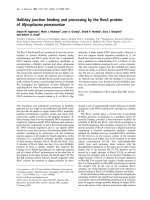Báo cáo y học: "Equipoise, design bias and randomized controlled trials: the elusive ethics of new drugs – a comment" pptx
Bạn đang xem bản rút gọn của tài liệu. Xem và tải ngay bản đầy đủ của tài liệu tại đây (22.65 KB, 1 trang )
Available online />We read with interest the article by Fries and Krishnan
about equipoise, design bias and randomized controlled
trials [1]. It is important to stress that equipoise is not the
principle underlying company-driven clinical trials, which
are doubtlessly necessary and useful for medical
progress. As a rule, companies’ clinical research
departments cannot afford the risk that their hypotheses
are invalid and, thus, that their trials will fail. Furthermore,
equipoise in non-commercial trials is a very complex issue,
which we do not intend to discuss here. So, “positive
expected outcomes” seems to be an interesting and
realistic alternative to equipoise.
We cannot, however, agree with the authors’ control
group considerations. From our point of view, it is not
acceptable for subjects assigned to a control group to be
denied standard treatment, even if the mean expected
outcome (expected outcome in the verum group plus
expected outcome in the control group divided by two) is
positive. One of the authors’ arguments for the
admissibility of control group treatments below clinical
standard is that patients are autonomous and can make
decisions on their own. In the case of most health
problems, patients are under enormous mental pressure
and are not necessarily able to weigh-up the pros and
cons in an objective way. Furthermore, the feasibility of a
placebo-controlled trial should not depend on a
company’s estimation of by how far the new treatment will
exceed standard treatment. Finally, and this is the
essential point, it is dangerous to undermine the patients’
right to get the best possible treatment. In most European
countries, social security systems enable patients to get
the best possible treatment. It is hard to understand why
this level of treatment should be neglected in clinical trials.
In conclusion, we think that the principle of “positive
expected outcomes” is an interesting and realistic
approach but we should not ignore the ethical principle of
“best possible treatment for every patient”.
Competing interests
The author(s) declare that they have no competing interests.
Reference
1. Fries JF, Krishnan E: Equipoise, design bias and randomized
controlled trials: the elusive ethics of new drugs. Arthritis Res
Ther 2004, 6:R250-R255.
Letter
Equipoise, design bias and randomized controlled trials: the
elusive ethics of new drugs – a comment
Wolfgang Schimetta
1
, Gabriele Poelz
1
, Werner Poelz
1
, Hans-Peter Haring
2
and Franz Aichner
2
1
Institute of Applied Systems Research and Statistics, University of Linz, Austria
2
Department of Neurology, Wagner-Jauregg, State Hospital Linz, Austria
Corresponding author: Wolfgang Schimetta,
Published: 23 November 2004
Arthritis Res Ther 2005, 7:E2 (DOI 10.1186/ar1482)
© 2004 BioMed Central Ltd








